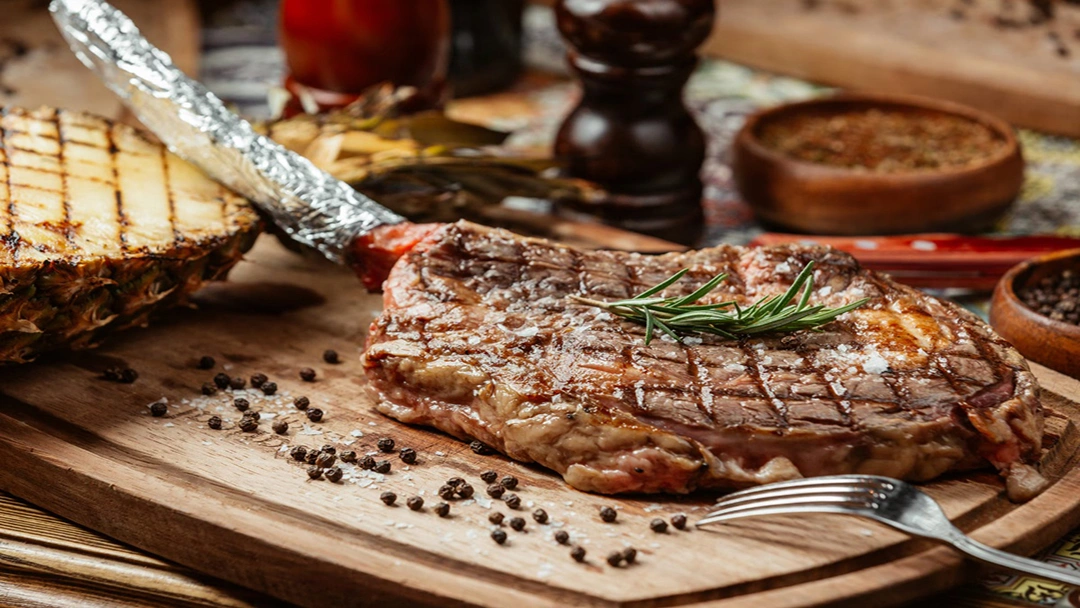Lion Diet vs. Carnivore Diet
Comparing the Carnivore vs. Lion Diet, we see that both focus on providing nutrients from animal-based foods, but their main differences are related to their
- Food List,
- Nutrients,
- Health Benefits, and
- Potential Side Effects.
Food List
The Carnivore Diet includes a wide range of animal-based foods like beef, pork, poultry, fish, organ meats, eggs, and dairy, which offer different flavors and textures that make it flexible and adaptable to different tastes.
However, the Lion Diet is more restrictive as it focuses only on ruminant meats, such as beef, lamb, goat, and organ meats as they provide essential nutrition for human health due to their fatty acid composition and nutrient density.
To help you easily compare the Lion Diet vs. Carnivore Diet regarding foods, you can check the following table that shows the allowed foods in each diet.
Learn More: 30-Day Carnivore Diet Meal Plan PDF (Downloadable File)
| Foods | Carnivore Diet | Lion Diet |
|---|
| Beef |
* |
* |
| Lamb |
* |
* |
| Goat |
* |
* |
| Bison |
* |
* |
| Organ meats |
* |
* |
| Pork |
* |
- |
| Poultry |
* |
- |
| Fish |
* |
- |
| Eggs |
* |
- |
| Dairy |
* |
- |
Nutritional Differences
The Carnivore Diet includes a wide variety of meats and animal products, which provide essential nutrients. For example, fish is full of omega-3 fatty acids, which are important for heart health and are known for reducing inflammation [2].
Poultry and eggs offer different types of fats and nutrients compared to red meats, which help you have a balanced intake of proteins, fats, vitamins (like D and B vitamins), and minerals (like iron and zinc) [3].
The Lion Diet focuses on nutrient-dense parts of animals, such as the liver and heart. These organ meats contain high levels of important vitamins like A, D, E, and K, which are essential for vision, immune support, and bone health [4].
They also provide high amounts of minerals like iron which is essential for oxygen transport in the blood, and zinc, important for immune function and wound healing [5].
So, all in all, the Carnivore Diet offers more nutrients than the Lion Diet because it includes a wider range of foods, that provide the essential vitamins and minerals your body needs.
[cta-gocarnivore-plans]
Health Benefits
The high protein and minimum carbohydrate content in the Carnivore Diet foods have positive effects on digestive health and metabolism.
By removing carbohydrates, which can cause bloating and gut inflammation in sensitive individuals, many dieters report better digestion and improved symptoms of conditions like irritable bowel syndrome (IBS) and inflammatory bowel disease (IBD) [6] [7].
Also, the Carnivore Diet helps the body switch from using glucose as the energy source to burning fats for energy (ketosis) and can boost fat burning, help weight loss, and improve energy levels [8].
On the other hand, the Lion Diet focuses more on ruminant meats and organ meats. Ruminant meats like beef and lamb provide heme iron and B vitamins, which help with better digestion and overall health [9].
Organ meats, such as liver and kidney, are rich in nutrients like vitamins A, D, K, and Coenzyme Q10, providing better eye health, immune function, bone health, and heart health [10].
Like the Carnivore Diet, the Lion Diet induces ketosis due to its low carbohydrate content. Ruminant meats also contain conjugated linoleic acid (CLA), a type of fat connected to potential metabolic benefits such as improved fat metabolism and anti-inflammatory effects [11].
Potential Side Effects
To compare the side effects of the Lion Diet vs. Carnivore Diet, we can say both can cause:
- Keto Flu: During the initial phase, both diets can induce symptoms like fatigue, headaches, irritability, and brain fog, commonly known as the keto flu, which can fade away in a few days. It’s caused by the transition from carbohydrate metabolism to ketosis [12].
- Digestive Issues: Those new to high-fat diets, can experience digestive discomforts, such as constipation, diarrhea, nausea, or abdominal pain in the starting phase [13].
- Kidney stones and gout: High protein intake can increase the risk of developing kidney stones and gout, especially in people who are prone to these diseases or those with impaired kidney function [14].
[cta-meetings]
But the Lion Die can also lead to:
- Potential Iron Overload: The Lion Diet, which emphasizes red meat and organ meats, can result in consuming too much iron. This could be a problem for people with genetic conditions like hemochromatosis or those who are prone to iron overload [15].
- Limited Food Choices: The Lion Diet can lead to a lack of variety and difficulty getting all the necessary nutrients over time. Since the variety of food in this diet is very limited, it can be repetitive and boring in the long term.
Take a look at the table below to see a summary of the main features of the Carnivore Diet vs. Lion Diet:
| Feature | Carnivore Diet | Lion Diet |
|---|
| Foods Allowed |
Beef, Lamb, Goat, Bison, Organ meats, Pork, Poultry, Fish, Eggs, Dairy |
Beef, Lamb, Goat, Organ meats |
| Nutritional Focus |
Wide variety of meats and animal products providing essential nutrients like omega-3 fatty acids, vitamins (B and D), minerals (iron, zinc) |
Ruminant meats and organ meats that are rich in vitamins (A, D, E, and K), minerals (iron, zinc), and conjugated linoleic acid (CLA) |
| Health Benefits |
Supports digestive health, metabolism, ketosis-induced fat burning, weight loss, and energy improvement |
Supports similar benefits to the Carnivore Diet with emphasis on specific nutrient profiles found in ruminant meats and potential anti-inflammatory effects of CLA |
| Potential Side Effects |
Keto flu, digestive issues (constipation, diarrhea), kidney stones, and gout |
Keto flu, digestive issues (constipation, diarrhea), kidney stones, gout, potential iron overload, and limited food variety |
As you see, each diet has its pros and cons, so you can’t label a diet as a “better diet” as each body is unique, with its own needs and conditions. However, there are some tips to help you choose wisely.
Learn More: How to Start a Carnivore Diet? When Should I Start? [Expert Guide]
Which One Is Better, the Lion Diet or the Carnivore Diet?
Choosing between the Lion Diet vs. Carnivore depends on your health goals and preferences.
If your goal is to treat a specific health condition like autoimmune issues or digestive problems, the Lion Diet's extreme elimination of all plant foods can be more effective in the short term.
[cta-meal-plan]
However, more research needs to be conducted on the long-term effects of the Lion Diet.
However, the Carnivore Diet is a safer choice for general health and wellness as it allows for more variety with the inclusion of eggs, dairy, and a wider range of meats, which makes it easier to meet nutrient needs with many low-carb and high-fat recipes. It's also easier for beginners who are not used to a low-carb lifestyle.
Ultimately, the best diet is one that fits your lifestyle, nutritional needs, and health goals and that you can maintain long-term for optimal well-being.
Learn More: Carnivore vs. Atkins Diet: Which One Boosts Weight Loss?
Conclusion
When comparing the Lion Diet vs. Carnivore Diet, we see they have many aspects in common because the Lion Diet is a limited version of the Carnivore Diet.
Also, consulting your healthcare professional is crucial to make sure which option is best for you to avoid any potential risks and side effects.






























